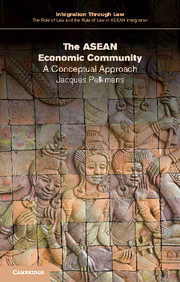Book contents
- Frontmatter
- Contents
- List of figures
- List of tables
- List of boxes
- General editors’ preface
- 1 Introduction and purpose
- 2 Foundations of economic integration fundamentals, stages and credibility
- 3 Conceptual foundation of the ASEAN Economic Community
- 4 Implementation of the AEC: progress in adopting instruments from the Roadmap
- 5 A reality check: comparing the AEC and NAFTA on substance
- 6 Options for the AEC and their practical implications
- 7 Conclusions
- Executive summary
- Appendix 1
- References
- Index
7 - Conclusions
Published online by Cambridge University Press: 05 March 2016
- Frontmatter
- Contents
- List of figures
- List of tables
- List of boxes
- General editors’ preface
- 1 Introduction and purpose
- 2 Foundations of economic integration fundamentals, stages and credibility
- 3 Conceptual foundation of the ASEAN Economic Community
- 4 Implementation of the AEC: progress in adopting instruments from the Roadmap
- 5 A reality check: comparing the AEC and NAFTA on substance
- 6 Options for the AEC and their practical implications
- 7 Conclusions
- Executive summary
- Appendix 1
- References
- Index
Summary
The aim of the present monograph is to make the ASEAN economic integration model intelligible by applying a conceptual approach. The AEC combines two concepts: the ASEAN single market (which is likely to grow into its own sui generis notion of deeper market integration); and ASEAN as a production base for world multinationals, as well as more and more for ASEAN business itself (and which is ill-defined or not defined at all, not even when carefully checking the ASEAN Blueprint/Roadmap with some 300 items of concrete measures and milestones). The underlying strategic economic aim, which unites all ASEAN countries, is rapid and steady development, underpinned by long-term economic growth and an acceptance of gradual but secure structural change. The AEC can neither be understood conceptually nor practically without this overriding development and growth perspective in mind or, better, in the minds of the ASEAN political leaders.
The monograph takes a systematic look at these ‘concepts’, starting from the fundamentals of economic integration – which also matter for ASEAN – the Bali ‘vision’, and a scrutiny of the five instrumental instrumental objectives (free flows, single ASEAN market, ASEAN as production base, equitable development and its economic competitiveness), followed by a careful summary of the entire AEC Roadmap. This analysis is deepened for the first three of these five instrumental objectives by scrutinising implementation, that is, the substance of the commitments in the Roadmap in considerable depth, including progress to date. Interestingly, with the Roadmap only publicly available for less than seven years, one can already discern many instances where ASEAN has deepened its commitments and/or has made progress beyond what was originally drafted. The AEC has clearly inspired and stimulated strategic thinking in ASEAN Member States, and has prompted policy action over a wide front of policy domains. We show in several domains that ASEAN has improved its understanding of the full implications of such an ambitious strategy. However, in a conceptual approach, such ‘good news’ is less important than the verification of whether ASEAN is living up to the conceptual requirements of what a single market and/or ASEAN as a production base is or will be.
- Type
- Chapter
- Information
- The ASEAN Economic CommunityA Conceptual Approach, pp. 196 - 201Publisher: Cambridge University PressPrint publication year: 2016



